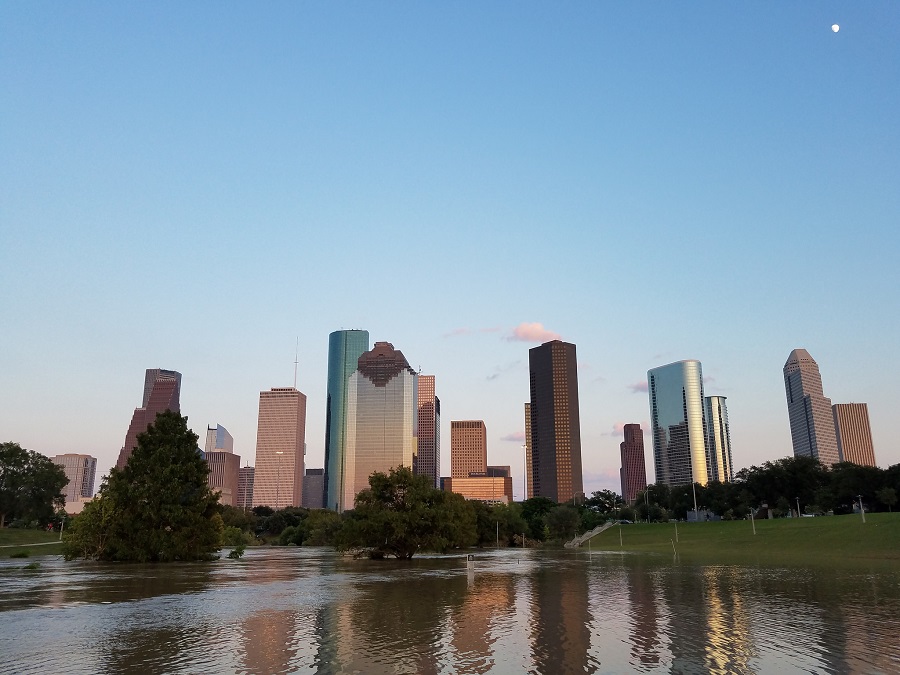
- Harvey-Related Death Toll Climbs to 39 [Houston Public Media]
- METRO Resumes Service with Limited Bus and Light Rail Schedule [Culturemap]
- Houston ISD To Delay Start of School Year Until Sept. 11 [Houston Chronicle]
- A Semi Truck Floated into Lucky’s Pub in the Heights During Harvey Flooding [Houston Press]
- Houston’s Historically Black Neighborhoods Devastated by Flooding, with Little Safety Net [The Texas Tribune]
- Costar Launches Mini-Site Analyzing Harvey Damage to Houston [CoStar]
- Why Houston Was a ‘Sitting Duck’ for Harvey Flooding [NPR]
- How Houston’s Layout May Have Made Its Flooding Worse [CNN]
- 5 Things Non-Houstonians Need To Understand About Harvey Flooding [Houston Public Media]
- A 12-Step Program for Houston To Address Its Serious Flooding Problem [Houston Chronicle]
- An Apartment Dweller’s Guide to Managing Harvey’s Aftermath [Houston Chronicle]
- Public Health Concerns Stirred Up by Harvey [Houston Chronicle]
- Houston Residents Coming Home Find Scent of ‘Mildew and Death’ [New York Times]
- 4 Workers Trapped for 2 Days at Wayside’s El Bolillo Bakery Spent the Time Making Bread for Harvey Victims [The Washington Post]
- Aric Harding Playing Piano in His Flooded Houston Home [Aric Harding/Instagram]
- RePurpose Depot Accepting Donations of Building Materials To Distribute to People in Need [RePurpose Depot]
- Unauthorized Drone Users in Houston May Face Fines [HBJ ($)]
- An Aerial View of the Flooding and Damage in Houston [abc13]
- Beyoncé Launches BeyGOOD Houston to Help Victims of Hurricane Harvey [Complex]
- She Fled to Houston After Katrina, Only to Relive It Again [Vox]
Photo: Marc Longoria via Swamplot Flickr Pool
Headlines





From the NPR article: “Because Houston lacks a zoning code, builders aren’t required to use flood mitigation techniques like green areas to absorb rainwater or retention ponds for runoff.”
This is an untrue statement. Houston DOES regulate impervious cover. Also, “green areas” do not have infinite capacity. The ground was pretty much already saturated before the rain started on Friday.
What WOULD help? More 5-story apartment buildings in the city and fewer single family homes in the suburbs. Building vertically results in less impervious cover per resident, and this is exactly what our lack of zoning allows Houston to do.
Independence heights is on the radar of more people more than ever since the homes newer built and older didnt flood.i got a letter yesterday from a company wanting to buy my property and before the floods we were already getting letters and theirs signs all around by investors wanting to buy our homes,since many rich communities have been destroyed in houston including the burbs the realtors among others are going to knock on our doors send several letters and make several phones making offers on buying our homes.my house is built up some my house is able to handle high water.i read an article saying if you’re house didn’t flood it will go up in value but if you’re house flooded it will go down in value as much as 60% percent depending on the area.since the developers will no longer be able to build on the wetlands,materials have gone up including labor the affluent will be the only ones that will be able to afford these new homes that will be on the market in the future.real estate experts said in 10 years houston will be as expensive as the west coast and east coast,but since the new guidelines that will take place and the other stuff i just mentioned houston is gonna be as expensive or close to being expensive just like the west coast and east coast in just a few years.since thousands of homes have been destroyed the locals will need housing plus the thousands of people coming to houston to help rebuild this city thats also gonna drive up the home values and rent.
@Angostura: Houston’s population density is about the same as Dallas. Houston ranks 51st in density compared to the 100 largest US cities even though Houston is the fourth largest. Houston is the most sprawled urban area in the US. That is because it has for a very long time been far cheaper to build outward horizontally than to build vertically inward. The City actually had to bribe developers with a $15k per unit tax incentive to get them to build multifamily in downtown.
The amendments to chap 42 regulating impervious cover are too little too late. First, the detention requirements only apply to developing land that has never had impervious cover. That is a hole big enough to fit a hurricane through. Second, the damage has already been done over decades of growth with no regard to adequate stormwater systems and building right up to bayous and creeks.
If you really wanted to force developers to build up in Houston, you would have required sufficient buffer zones between bayous and creeks and residential areas that included large detention ponds and additional reservoir capacity to offset the sprawl. That would make land more expensive and force development to go vertical.
Take the (repeatedly) flooded homes, especially along upstream Cypress Creek, condemn them and turn it into a new water retention area/regional park. No more tax dollars should be spent to rebuild these any more.
Smiley: My home didn’t flood, though a few blocks away, others did. I wonder if we could get a ‘Certificate of Nonflooding’ or some such official thing. I always laugh when I see a home listing with the words ‘Never flooded, per owner’. Yeah, right!
WR – couldn’t agree more (and that’s as someone who grew up not 1,000 feet from Cypress Creek). We need stronger use restrictions around flood zones – it’s not going to get any better, and our current uses show a baffling lack of understanding about coexistence with geographical realities.
my house was built in 2011 and many of the homeowners have homes built in 2011,2012,2013,2014,2015 and the homes are built up in independence heights so they never flooded.
WR and TMR,
Most homes that flooded twice over the last 2-3 year period will not be allowed to rebuild if their damage this time around is greater than 50% of the value.
If the property owner does want to rebuild, the home will need to be lifted 12-18 inches above 100-year floodplain and no government money will go to the construction. Within Houston, this will eliminate many homes along bayous that experienced flooding in during the Tax Day and Harvey. This is part of the floodplain ordinances and regulations. Much of the language in the ordinance is standard language from FEMA. This language is required if the city or county would like for residents to be capable to buy flood insurance. In a way, the floodplain ordinances allow for development in the floodplain to an extent and will stop wasting money if flooding occurs repeatedly.
Additionally, Harris County, and Houston will get federal funding that can be directed towards buyouts.
HCFCD will look into buyout areas as potential candidates for regional storm water detention.
This process has been used during past major flooding events.
In a roundabout way, current regulations and mother natures are reclaiming floodplains one disaster at a time.